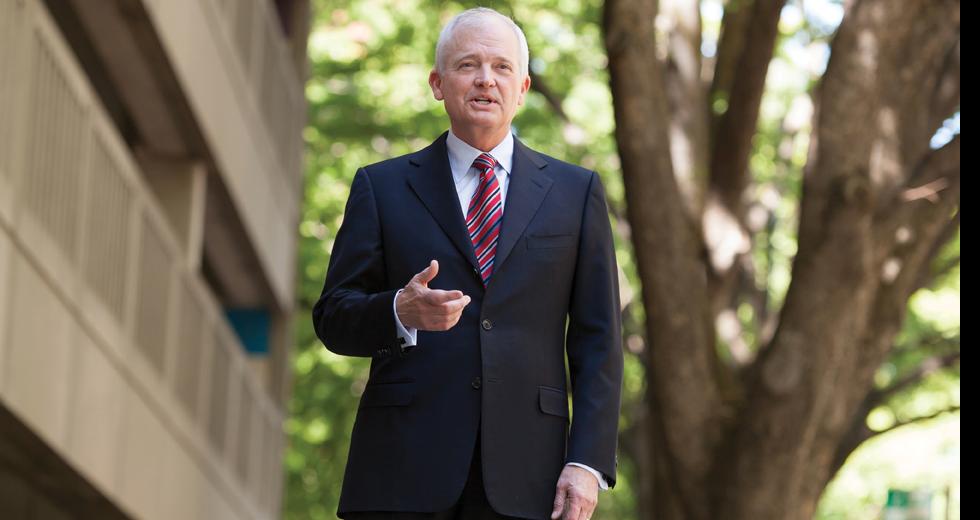Since 2007, Rodney Brown, 65, has served as the president and CEO of the California Bankers Association, which represents the majority of banks doing business in California. In this role, Brown leads the state and federal legislative, regulatory and judicial advocacy efforts of the association. Previously, Brown spent 35 years as a commercial banker, including 12 years as the president and CEO of Montecito Bank & Trust in Santa Barbara.
As a banker and an advocate for the industry, I’m always quick to emphasize that banks are a reflection of what’s going on with our customers. How your customers are doing impacts how the bank is doing, which is obviously what has gone on for the last five years.”
“During the economic downturn, people were rightfully uncertain about their next paycheck. They became cautious, fiscally conservative, and those that could put more into savings. Ultimately, when people build up their savings and reserves, that will drive consumer spending. But it’s a very delicate walk. With interest rates where they are today, savers are actually at a disadvantage.”
“Today we have a very well capitalized, healthy group of commercial banks operating in California. They have worked their way through most of the economic downturn. The state’s banking industry is very well positioned to continue serving businesses. Certainly, a part of that is the extension of credit.”
“It’s certainly more costly to be a banker in California than it is to be a banker in Nevada. Like all other employers, the business environment and costs of attracting and retaining good employees are a challenge. Then, when you layer over that the federal health care and regulatory oversight, it’s very tough on the banker as an employer.”
“And then, along comes Dodd-Frank, which as we speak is being transformed from legislation to regulation. Today, we are maybe three-fifths through the process. There are already 9,000 pages of legislation that have been written. There are another 6,000 to 7,000 pages to go. This is an enormous burden for banks. By investing in infrastructure systems to ensure regulatory compliance, banks have had to raise the cost of doing business, which has reduced the return to shareholders. It has also caused some players to exit the industry, which has created consolidations.”
“Five years ago, there were 307 banks headquartered in California and 354 that were doing business here. Today, there are 284 banks doing business here. Those that are left are in good shape. They have worked through their nonperforming loan portfolio and other credit issues. They have increased their capital position. In today’s economic environment, the industry’s biggest challenge is to maximize the return to shareholders.”
“I would tell you that banks don’t create loan demand. They respond to needs. Our bankers, our members, are telling me that the demand for lending, the need for business borrowing is actually diminishing. If you’re operating a business and are uncertain about the tax environment, health care scenario and the demand for your product or services, the last thing you’re thinking about is taking out a loan to grow your business.”
“It’s well documented that employers have been cautious about investing. If companies are not interested in spending money, that diminishes the demand for term loans and lines of credit. I just talked with a Sacramento bank this morning that has $460 million in assets. They are sitting on a $165 million securities portfolio. This is a bank that wants to loan money; that’s how they make money. And they are not loaning money because of undue regulatory pressure. They’re not loaning money because they are either not seeing demand or are looking at opportunities to lend that cannot be underwritten.”
“The last thing any banker wants to do is make an imprudent loan. If a small business owner is telling a journalist or an elected official that they can’t get a loan, it’s usually because of one of the following issues: they’re looking for capital because they have none in their business; they have capital, but they don’t have the required demonstrated cash flows; or, finally, they have credit issues.”
“Don’t blame it on the banks. They are trying very hard to push the limits of underwriting as thoughtfully as they can. Because if they are not lending money, they are not growing and not making money. Which is so fundamental to what banks do. If they can make a loan, and it is sufficiently underwritten, they are going to extend credit. That’s how it works.”
“If you’re a very challenged small-business owner in this state and you need capital to survive, I feel your frustration. If your business isn’t doing well, and you need borrowed money to stay afloat, of course you’re going to be telling anybody who will listen that there is no loan money to be had. Unfortunately, it’s not that simple. The situation is much more complex.
“Yes, we are humbled by what has happened and what is going on. But we are also optimistic about the professional banking opportunities before us. We are convinced that we’re going to rebuild our reputation as an industry one bank, one banker at a time, and not through some national advertising campaign that says, ‘We’re not as bad as you think we are.’”
“As far as I’m concerned, banking remains a very noble profession. I’ve always been very proud to be a banker. Being a banker is not about creating need but instead listening and responding to need. As someone with 35 years of banking experience, it’s very painful to see the black eyes the industry has suffered in the past five years. It has gone from having a reputation as a very highly regarded place to a very humble place.”
“That said, commercial banks in California employ 117,000 people. An individual starting a career or in mid-career can imagine a very rich opportunity in being part of the banking industry. That is not going away. It’s going to get stronger. There are a lot of encouraging signs that the future is going to be brighter. One of the things we continue to emphasize, even with the hit our reputation took on Wall Street, is how important our industry is to every community in California. And how not only are we supporting employers, but that we are good corporate citizens.”
Recommended For You

Commercial Lending Forecast
Softening standards with a chance of loans
This year could provide some of the first expansions in bank lending since 2008. So is the market back up to speed? No. But banks are slowly and smartly increasing their appetites for commercial lending, and the Capital Region will see its share of transactions.

The Big Squeeze on Small Credit Unions
They may be on the verge of extinction
On a hot, sunny morning last fall, 69-year-old retiree Pamela Chappell of Citrus Heights hit rock bottom. She was scraping by on Social Security checks and a tiny pension while paying for medication to treat her lymphedema, a painful swelling in her legs. Then she got a letter from the IRS warning her that it was about to empty her savings account of $8,000 — every dollar she had — for back taxes.



